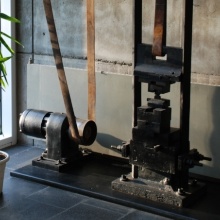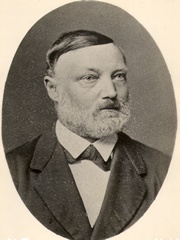
Professor Carl Heinrich Schmidt
1858
Professor Carl Heinrich Schmidt (1858-1881)
The history of the chair and the later Institute for Machine Tools (IfW) begins in 1858 with the introduction of the subject "Mechanical Technology" at the Polytechnic School in Stuttgart, after the chair had already been represented since 1833 by Professor F. Kalbfell and later for a short time by Professors Berg and E. Zech, already the subject "Machine Drawing" was taught as a construction-oriented subject.
From 1858 to 1881 Professor Carl Heinrich Schmidt was the first within his field of study to teach the subjects "Popular Mechanics and Combustion Engineering". He also gave lectures on "Cutting and Forming Machine Tools" and "Wood and Stone Working Machines".
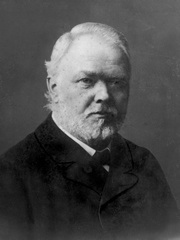
Professor Adolf Groß
1879
Professor Adolf Groß (1879-1883)
At the beginning of the academic year 1879/80 Professor Adolf Groß is appointed. He gives lectures on movement mechanisms, lifting devices, railway vehicles, machine tools and mechanical engineering for engineers and architects. In the subjects railway vehicles and machine tools he teaches the students of the 7th semester. At that time the lecture Machine Tools already included: general information about tools, machines for working metals - lathes, drilling machines, planing and slotting machines, machines for threading, milling, grinding and forging machines - as well as machines for working wood, and the establishment and operation of workshops for machine production.
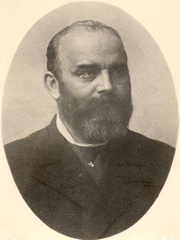
Professor Johann Zeman
1881
Professor Johann Zeman (1881-1900)
Professor Johann Zeman has been the successor to Professor Carl Heinrich Schmidt, who retired in 1881. He teaches until 1900.
Professor Johann Zeman's term of office includes the discovery of high-speed steel and the first systematic investigations of the machining process during turning by the Pittsburgian engineer Frederic W. Taylor. This event had a groundbreaking significance for industrial production at the time. It is the beginning of the rapidly developing theory of machining, which also becomes the subject of knowledge transfer in Stuttgart.
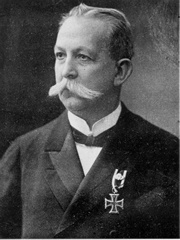
Professor Adolf von Ernst
1884
Professor Adolf von Ernst (1884-1893)
In 1884 Professor Adolf von Ernst was appointed to succeed Professor Groß. He expands his field of study by the subject of machine elements and in 1893 gives the lecture on machine tools to Professor Zeman.
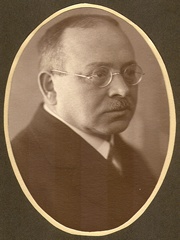
Professor Alfred Widmaier
1900
Professor Alfred Widmaier (1900-1935)
As the successor of Professor Zeman, Professor Alfred Widmaier now separated the greatly increased subject matter of machine tools from that of mechanical technology, so that at the beginning of the 20th century the subject of "machine tools" was taught as an independent subject in addition to "mechanical technology and ferrous metallurgy".
It is also thanks to Professor Widmaier that a laboratory for machine tools can be established with the active support of the domestic mechanical engineering industry, which in the meantime has achieved worldwide importance. From this laboratory, the Institute for Machine Tools at the former Technical University of Stuttgart developed.
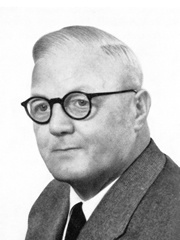
Professor Alfred Erhardt
1936
Professor Alfred Erhardt (1936-1964)
After Professor Widmaier's retirement, Professor Dr.-Ing. Alfred Erhardt is appointed and takes over the newly structured chair and the Institute for "Machine Tools and Introduction to Mechanical Engineering", with the affiliated departments "Machine Drawing" and "Standardization".
The investigations at the Laboratory for Machine Tools concentrate on comparative tests on plain and anti-friction bearings for main spindles of machine tools. Investigations are also carried out on machine tools in general as well as on special components such as gears, couplings and elements of oil hydraulics. In the field of drive and control technology, research work is carried out on oil-hydraulic drive, control and working elements. Further focal points are studies on honing as well as studies on the influence of vibrations on the working quality during precision turning.
1951
apl. Professor Walther Leyensetter
W. Leyensetter, the then lecturer for cutting theory, carries out systematic cutting tests, mainly with regard to chip formation and short tests of machinability.
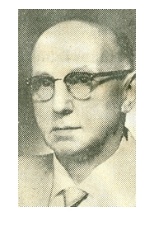
Honorary Professor
Kurt Tschernjakow
1953
Honorary Professor Kurt Tschernjakow (1953-1969)
The field of woodworking and woodworking machines is represented by the honorary professor Dipl.-Ing. Kurt Tschernjakow. In his research work he is particularly concerned with the investigation of cutting forces during wood cutting and the development of suitable transducers for this purpose.
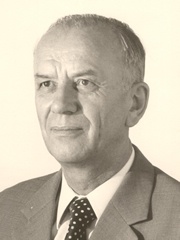
Professor Karl Tuffentsammer
1965
Professor Karl Tuffentsammer (1965-1987)
After Professor Erhardt's death shortly before his retirement after a serious illness, Professor Dipl.-Ing. Karl Tuffentsammer is appointed as his successor to the Chair of Machine Tools with effect from October 1, 1965.
The Institute for Machine Tools is divided into three departments, which are coordinated in terms of organization and subject matter. Each of the departments "Design and Manufacturing Concepts", "Design Elements and Special Problems of Machine Tools" as well as "Machining and Ablative Machining Processes" are headed by a department head and consist of task-oriented working groups.
The main focus of research is on deep drilling and the design of automation components for flexible manufacturing. Trend-setting work on noise emission of hydraulic assemblies is being carried out, which is also being incorporated into DIN as part of Professor Tuffentsammer's commitment to standardization work.
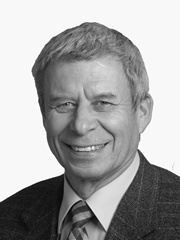
Honorary Professor Hans Dietz
1981
Honorary Professor Hans Dietz (1981-2016)
In teaching, the field of woodworking machines has been represented since 1981 by honorary professor Dr.-Ing. Hans Dietz with his lecture "Machines and plants for woodworking - machining of non-metallic materials".
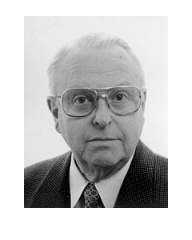
Honorary Professor
Gerhard Haasis
1984
Honorary Professor Gerhard Haasis (1982-1994)
From 1982 to 1994, honorary professor Dr.-Ing. Gerhard Haasis gave lectures on "Cutting and ablating processes in precision machining". In research, he supports projects and student work in the field of honing from industry, such as the project on ultrasonic or vibration superimposed honing to improve surface quality and productivity.
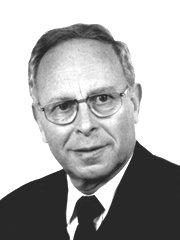
Professor Alfred Storr
1987
Professor Alfred Storr (1987-1988)
Professor Tuffentsammer suffers a heart attack shortly after his retirement in spring 1987 and dies. The orphaned chair and the Institute for Machine Tools are temporarily managed by Professor Alfred Storr of the Institute for Control Engineering of Machine Tools and Manufacturing Units (ISW) from May 1987 until a successor is appointed. The chief engineer at the IfW is Dr.-Ing. Cosmas Magnus Lang, who, together with Professor Storr, is responsible for the technical and factual continuation of the current research activities, especially in the DFG projects.
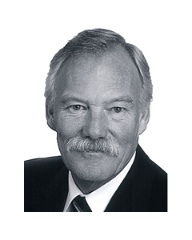
Professor Uwe Heisel
1988
Professor Uwe Heisel (1988-2014)
On July 1, 1988, Professor Uwe Heisel was appointed to succeed Professor Karl Tuffentsammer. Due to his industrial activities, he is characterized by the flexible manufacturing automation with FMS, which was the focus of interest at that time. This leads to an expansion in research and teaching at the IfW and is consistently extended to the topic of reconfigurable machine systems (RMS).
On the basis of the institute structure taken over from his predecessor, he creates four new departments at the IfW, namely the one for "Cutting Technology" with a focus on drilling and deep drilling, the one for "Machine Design" with a focus on machine tools with parallel kinematics (PKM) and the one for "Machine Investigation and Optimization" with a focus on "Dynamics", "Thermics" and "Emissions". In addition, there is the newly created department for "Woodworking Machines and Technology", which he headed from December 1990 under the direction of Dr.-Ing. habil. Johannes Tröger. In March 2000, Dr. Tröger was appointed full professor.
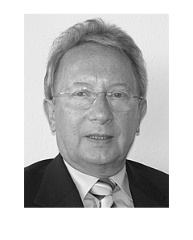
apl. Professor Johannes Tröger
2000
apl. Professor Johannes Tröger (2000-2006)
Professor Johannes Tröger gives lectures on woodworking technology and scientifically deals with the construction of special tools for woodworking. He also focuses on the safety technology of woodworking machines and power tools as well as on research work to avoid wood dust emissions. During his term of office as head of the department, he founded the Research and Testing Association for Woodworking Machines (FPH) and established the GS-certified wood dust test laboratory at the institute.



